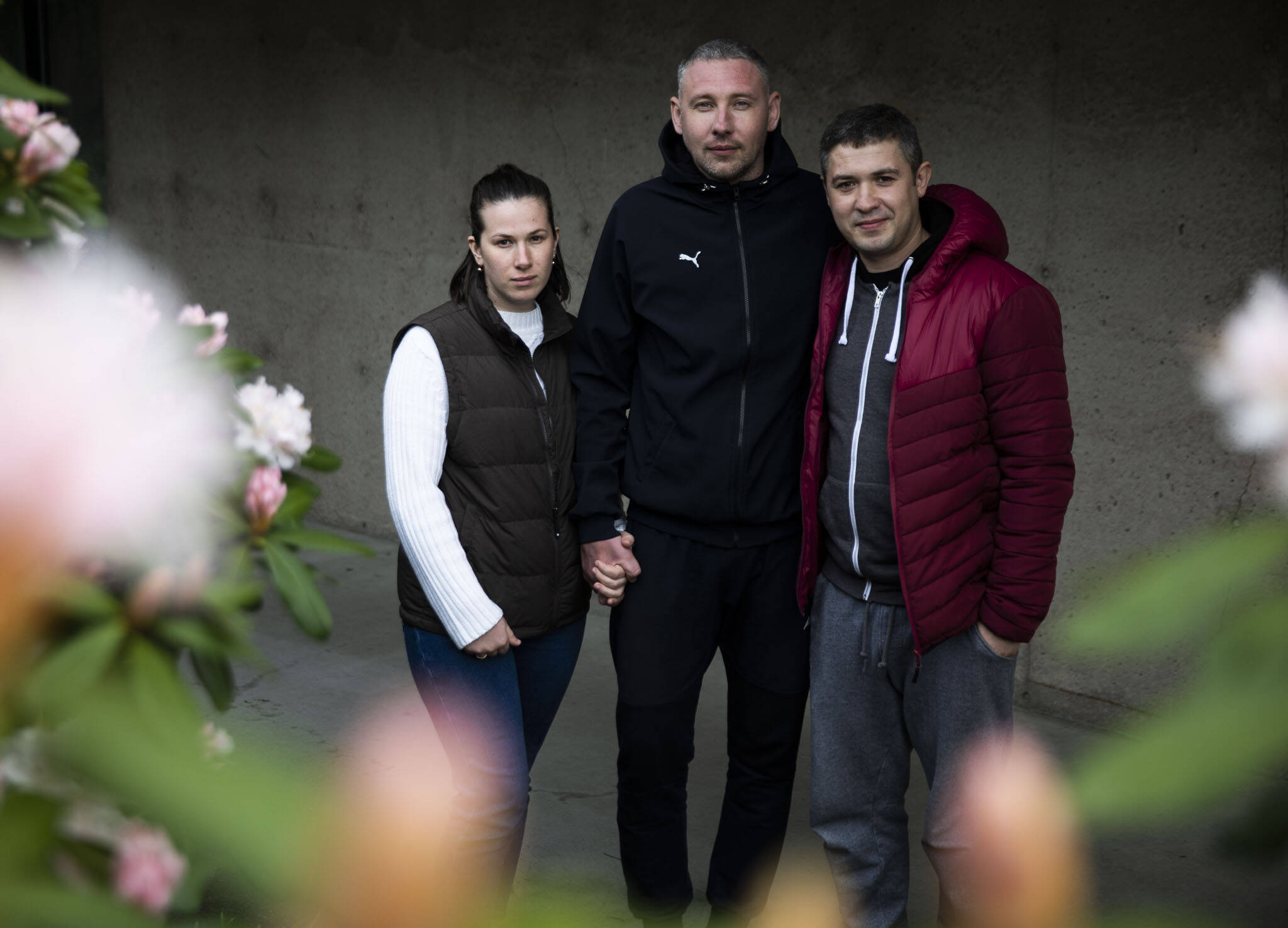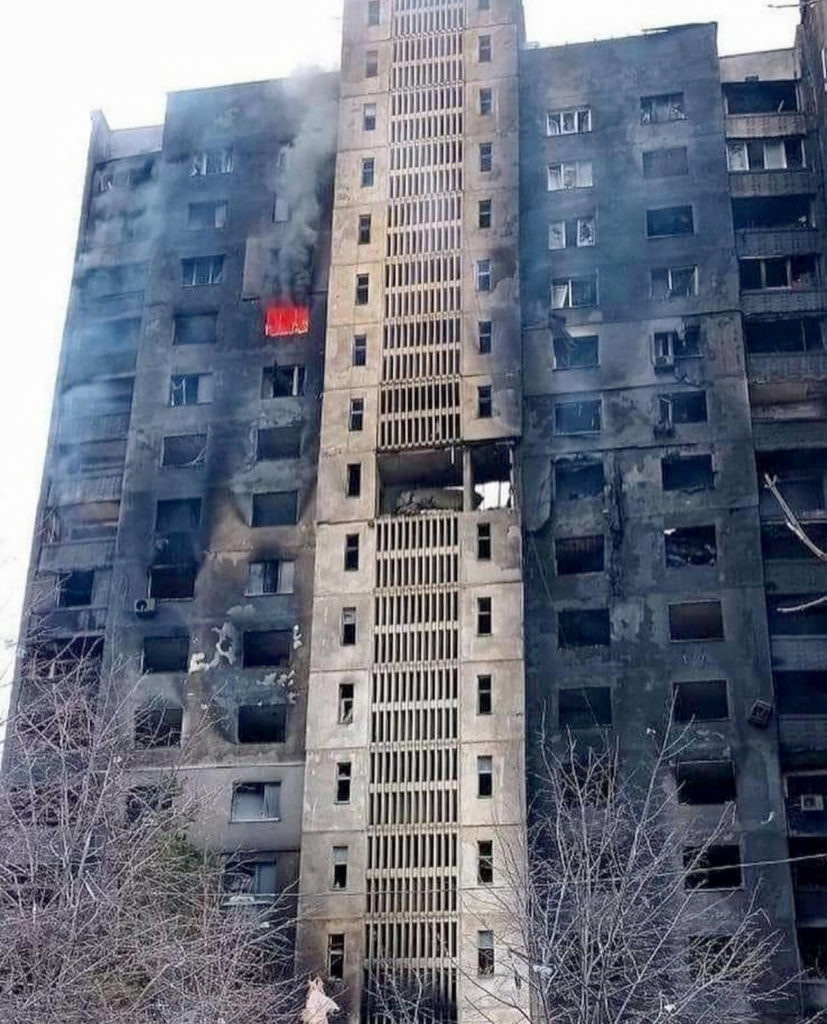EVERETT — Nataliia Ktitorova described her life in Kharkiv, Ukraine as “normal.” Through an interpreter, she said her husband Vitalii worked as a taxi driver. With two young daughters, the couple dreamed of buying a home someday.
She paused and snapped her fingers — that’s how fast things changed.
The family’s hometown is in ruins now, bombed by Russian forces. This week, friends sent videos of their church demolished by a rocket.
Now Nataliia, her husband, brother-in-law Yosip Lakatosh and sister Tetiana, along with all their children, are living with relatives in Everett. Eleven people are crammed into a two-bedroom home.
Federal, state and local officials say they’re preparing for incoming Ukrainian refugees. But in Snohomish County, they’ve already arrived.
“Everyone in our state thinks Ukrainians are still in Poland,” Van Dinh-Kuno, executive director at Refugee & Immigrant Services Northwest, told The Daily Herald. “No. They’re here.”
The agency is helping about 35 Ukranians who started trickling in last week. Dinh-Kuno said Snohomish County is likely the first in the state to receive the refugees. She described “scrambling” to organize a countywide program to help the newcomers. So far, Dinh-Kuno has relied on local food banks to get supplies to families. The state is appropriating millions of dollars for counties to assist.
“We’re working and moving as fast as we can,” Dinh-Kuno said. “We don’t have a choice. We never close the door on anyone.”
Nataliia said the family lost their home, and “a lot of friends who have died.” Their savings are depleted after traveling through seven countries before finally making it to the United States, where they knew family and a robust Ukrainian community would be waiting. The journey took two weeks.
“The children got very scared,” she said.
In the airports, the 2- and 4-year-old girls clung to their mom, frightened by loud planes. It was the same noise that accompanied bombs back in Ukraine. Yosip’s children, ages 10, 7 and 4, are still asking when they can see their dog again.
‘We didn’t know where to go’
In late February, Vitalii tried to pick his mother up from Luhansk. Evacuations in the separatist region of Ukraine had already begun, but Russian forces turned him away. He watched in shock as tanks approached the Ukrainian border.
He phoned Nataliia back in Kharkiv.
“We didn’t know where to go at that moment,” she said.
Vitalii’s mom is still in Luhansk. Nataliia and Vitalii fled to smaller towns, “until the planes came,” she said.
They slept in their daytime clothes in case they had to leave in the middle of the night. When a bomb fell just three houses down, Nataliia and Vitalii decided it was time to go.
“We got lucky,” Nataliia said of the shelling.
They forged west, at times sleeping in their car.
But when officials told Vitalii he could not leave with his family, despite Nataliia’s medical problems and their young children, the family returned to Kharkiv, where they heard officials would be more willing to make an exception.
When they got there, they found their hometown demolished.
“So many broken cars. Bombed cars,” Nataliia said. “Stores. Gas stations. Everything was destroyed. There was no water … there was no heat. It was minus nine. Freezing temperatures.”
On YouTube, Nataliia and Vitalii had watched videos about getting to America through the southern border.
They traveled through Russia, Latvia, Lithuania, Poland, Italy and Spain to find a ticket to Mexico they could afford. The plan was to cross the border on foot.
Yosip had already done it with his wife and three children.
Sitting across from Nataliia this week, Yosip told the story.
‘Tюрьма’
Yosip was a builder in Kharkiv when the war began. Before fleeing, his crew drove through active shelling to pick up their final paycheck. He needed the money to pay for his family’s tickets out of Europe.
“Praise God that God kept us safe, and we’re here now,” Yosip said.
With a borrowed car, Yosip took his family to Russia, where officials stopped and questioned them.
“They were saying, ‘OK, you know what kind of situation (this is) right now. We can shoot you,’” he said. “‘If you’re not going to follow all our rules, then we can shoot you.’”
After staying in churches converted to shelters, and abandoning the car in Romania, they finally got to Mexico. Yosip hired a taxi driver to get them close to the border.
From there, they ran.
“With my daughter on here,” Yosip said, gesturing to his shoulder. It was an 800-meter dash over a small fence. His wife, Tetiana, carried their youngest child. A friend carrying their third. But the journey didn’t go as planned.
Border Patrol apprehended Yosip’s family. They landed in “Tюрьма,” Yosip said. “Jail.”
He described the border detention center as a large tent with hard mattresses and no pillows. Harsh lights ran 24/7. He lost track of day and night, but reckoned his family was detained for almost three days. He was separated into a section just for men.
On Thursday, Yosip lifted his leg onto the table and pulled his sweatpants up. A monitoring device was still strapped to his ankle. The federal government released him from the detention camp, but is tracking his movements.
“Maybe if I knew how hard it’s going to be, I wouldn’t go,” he said. “We are smiling now, but at that moment, what I have seen, we couldn’t smile.”
After hearing Yosip’s story, Nataliia said her family prepared for the same experience. They made sure to bring running shoes.
But in the 48 hours or so between Yosip’s border crossing and their own, Nataliia received word that border officials had changed their approach. The family would be granted “humanitarian parole.” According to U.S. Citizenship and Immigration Services, the status is dependent on “an urgent humanitarian reason.”
The family had a starkly different greeting upon their entrance to the United States.
Vitalii opened his passport to show a small document U.S. Border Patrol issued him.
“Then they said ‘Welcome to America,’” Vitalii recalled.
Lawyers at Refugee & Immigrant Services Northwest are helping all of them apply for asylum. But Yosip’s family, Dinh-Kuno said, “will have to jump through a lot of hoops,” simply because they arrived a few days earlier.
‘Our duty’
Dinh-Kuno is working to get dozens of Ukrainian refugees into permanent housing and enrolled in English classes at Everett Community College. She’s coordinating medical appointments to get children up-to-date on their vaccinations and enrolled in schools.
She said the state needs to stand up a plan quickly. Its approach to helping Afghan refugees serves as a template.
The state Department of Social and Health Services is still awaiting federal guidance on how Ukrainian refugees will be received, according to spokesperson Norah West. The agency will receive $28.4 million in state funds to help Afghan and Ukrainian refugees who arrived after June 30, 2021.
Another $5.5 million is on its way to the state Department of Commerce to help counties assist “newly arriving refugees from the 2022 Ukraine-Russia conflict.”
Since 2010, over 65,000 Ukrainians have resettled in Washington.
Dinh-Kuno is expecting more to arrive in Snohomish County in the coming days.
That includes Andrii Ocheretnyi, who could arrive in coming days. On Thursday in Everett, his wife Tetiana Kholodiuk said he was stuck in Russian-occupied Donbas region, but was able to escape to the country of Georgia by “just a miracle.”
Kholodiuk, who is Nataliia’s cousin, described friends being killed for refusing to join the Russian army.
“If you say you don’t want to go to war, they just kill you,” Kholodiuk said. “And he is the witness. Three of his friends were killed because of that. He is a witness of the war, of what they’re doing to Ukrainian people.”
President Joe Biden this week said the United States would welcome up to 100,000 Ukrainian refugees. And the White House is moving to provide $1 billion in humanitarian aid to help address the fallout of the war.
Dinh-Kuno said she wouldn’t be surprised if Snohomish County accommodates many of the Ukrainian refugees coming to Washington.
“It’s our duty to help and support and start new life in our state,” she said. “And we have no excuse to not do that.”
As for Everett’s newest residents, still crowded in a two-bedroom home, they said they have a message for the community.
“If it is possible, please help the refugees that are going to come from Ukraine to Washington right now,” Vitalii said.
“Always be human,” Nataliia said. “There are still some good people in Russia. It’s not the people’s fault. It’s political.”
Claudia Yaw: 425-339-3449; claudia.yaw@heraldnet.com. Twitter: @yawclaudia.
Talk to us
> Give us your news tips.
> Send us a letter to the editor.
> More Herald contact information.


























